Nourishing Your Feathered Companions: A Guide to Bird Nutrition

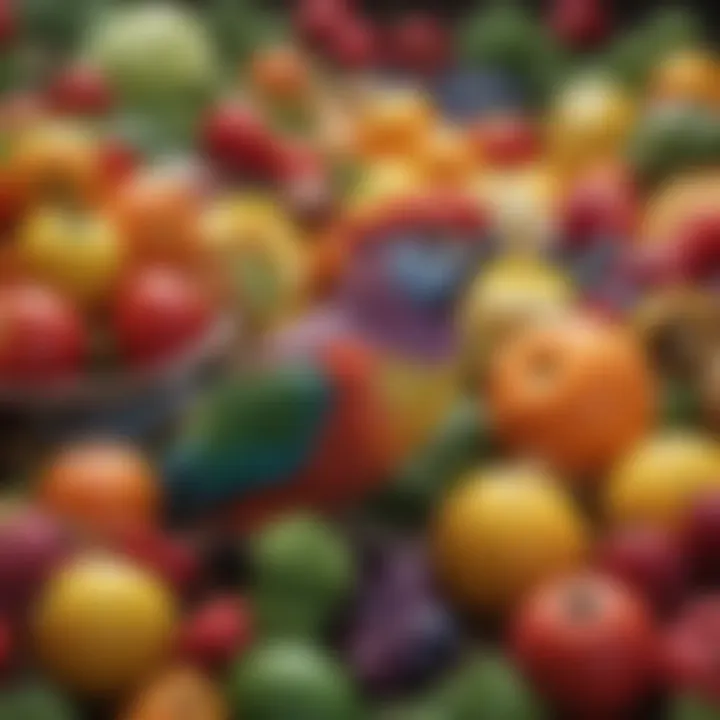
Intro
When it comes to caring for pet birds, nutrition serves as the cornerstone of health and happiness. Each bird species possesses unique dietary needs that can significantly impact their quality of life. Of paramount importance is the distinction between various food types and their intrinsic benefits. This guide aims to demystify the complexities of avian nutrition, providing a blueprint for owners to offer balanced diets while steering clear of common misconceptions.
Understanding what constitutes a nourishing meal for your feathered companion involves diving into the foundational elements of their dietary requirements. With the right information, bird owners can create an optimum feeding regimen that caters to their pets’ well-being, enriches their environment, and promotes longevity.
Care Tips
Daily Care Routines
Daily care for pet birds goes beyond simply filling their food dish. An ideal routine encompasses everything from cleaning their cages to monitoring their behavior for any signs of distress. Begin each day with a fresh supply of water and food. Some owners prefer to offer a mix of seeds, pellets, and fresh produce to ensure a varied diet.
Cage Setup and Maintenance
Cage maintenance is vital for both health and morale. Regular cleaning is necessary to prevent the accumulation of waste, which can lead to bacteria growth. A once-a-week full clean, including disinfecting the cage, is recommended. Use bird-safe products for cleaning to ensure no harmful chemicals remain.
Consider the size and layout of the cage as well. Provide ample space for movement and perches of varying heights to promote exercise. This can mimic their natural environments and encourage healthier lifestyles.
Hygiene and Cleaning Practices
Maintaining hygiene is critical for disease prevention. Daily tasks such as verifying water cleanliness, emptying unnecessary foods, and clearing debris contribute to a healthier habitation. Changing the cage liner often minimizes mess. Also, regular washing of toys and perches with hot water removes dust and detritus that can accumulate.
Seasonal Care Adjustments
Seasonal changes can significantly impact bird care. In winter, heat sources might dry out the air, leading to dehydration. Conversely, summer can result in overheating without proper ventilation. Modifying care routines to account for temperature variations can keep your bird healthy. Special care in choosing appropriate perches and using humidifiers during dry months may positively affect your bird’s health.
Behavioral Insights
Understanding Bird Body Language
Birds communicate through various forms of body language. Understanding this language is essential for fostering a harmonious relationship. Venturing into their behaviors can reveal when they're stressed, frightened, or comfortable. Simple cues such as feather fluffing or head bowing provide valuable insights into their emotional state.
“A bird that is not healthy will often exhibit changes in posture or retreat from social interactions.”
Common Behavioral Issues and Solutions
Certain behavioral issues may arise that require attention. These can include excessive screeching or feather plucking. Assess any significant changes in their environment as a possible trigger. Engaging them in playtime or providing stimulating toys may divert these tendencies.
Positive Reinforcement Techniques
Reward-based training strategies often yield excellent results. Offering treats for desired behaviors helps reinforce good habits. This not only promotes bonding but also enhances the bird's abilities.
Social Interaction Needs
Most pet birds thrive in social settings. Regular interaction with their owners helps alleviate loneliness, which can lead to emotional distress. Forming a routine that includes designated playtimes ensures they receive adequate attention and involvement in the family dynamic.
Nutrition Guides
Essential Diet Components
A balanced diet is essential. Providing a mix of high-quality pellets, grains, seeds, and fresh vegetables can enhance health. Pellets usually serve as a staple, single-nutrient option while seeds can serve as treats. It is important to consistently evaluate dietary offerings.
Safe and Toxic Foods
Certain foods are beneficial while others pose risks. Safe choices include sweet potatoes, broccoli, and apples. Meanwhile, avoiding foods like chocolate, avocado, and caffeine is crucial, as these can seriously harm your bird.
Supplements and Treats
Occasionally supplementing their diet can also support enhanced nutrition. Products like cuttlebone provide necessary calcium. Additionally, nutritionally-rich treats can break the monotony and contribute to overall well-being.
Feeding Strategies for Different Species
Different species exhibit varying nutritional requirements. For example, larger parrot species may need more seeds, while smaller birds benefit more from finely minced veggies. Familiarizing oneself with particular species' needs is imperative to ensure proper nutrition.
Wellness and Health
Routine Health Checkups
Annual veterinary checkups are just as necessary for birds as they are for other pets. Regular assessments help can identify early signs of illness. Creating a healthcare log ensures consistent tracking of your bird’s health status.
Identifying Symptoms of Illness
Being vigilant about any behavioral or physical changes can help detect potential ailments early. Lethargy, changes in eating habits, or excessive feather loss may indicate health concerns. Addressing these variables without delay minimizes negative outcomes for your pet.
Preventative Care and Vaccinations

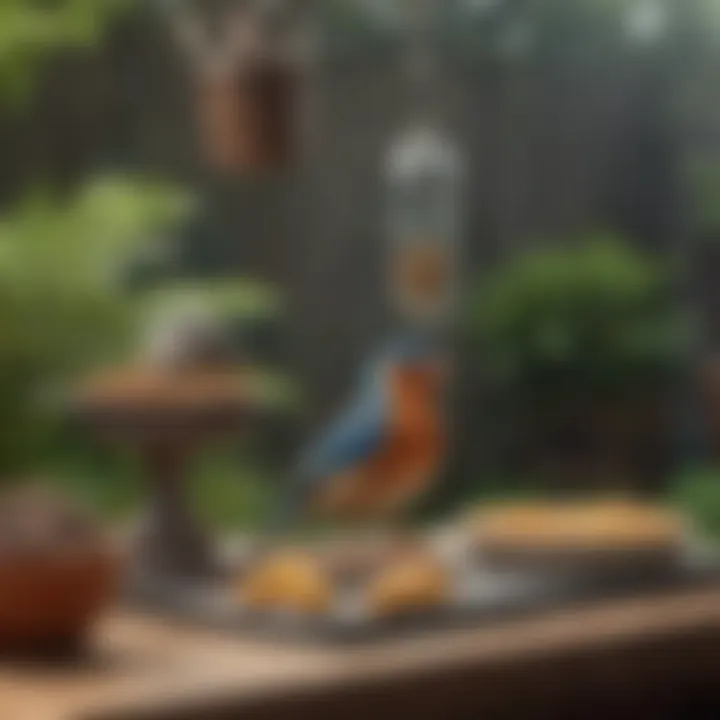
Engaging in preventative care is crucial for long-term health. Evaluating feeding regimens, social environments, and routine wellness checks can present key indicators that may combat diseases effectively.
Mental and Emotional Well-being
A bird's mental stability is tied to physical health. Positive enrichment strategies, including decorative arrangements of perches and avenues for climbing, contribute to a thriving creature.
Enriching Activities
Toys and Playtime Ideas
Accessible toys encourage mental stimulation. Teasers and foraging toys are excellent for engaging competitive interests. Customizing play materials caters to animal preferences, leading to richer social engagement.
Training and Tricks
Training not only provides enrichment but also strengthens the bond between owner and pet. Teaching simple commands isn’t just educational. It gives increased interactivity and reduces feelings of isolation.
Outdoor Activities and Interaction
If feasible, letting birds experience outdoor sensations under supervision can expand their experiences. Fresh air yields nutritional benefits while observing environmental textures provides exploratory stimulation hours of fun.
DIY Projects for Mental Stimulation
Crafting homemade toys out of safely accessible materials can lead to endless enjoyment for birds. Simple tasks engage their minds while personalizing your care reinforces ownership and connection.
In summary, knowledgeable bird owners can harness the information presented to enhance their birds' overall health and vitality. Through proper care routines, heightened awareness of behavioral traits, astute nutritional understanding, health oversight and critical engagement strategies, the path to raising vibrant avian companions becomes clear. By implementing these strategies, formulating a unique feeding regimen tailored to their species, and monitoring their health closely, guardians can elevate their creatures' living conditions.
Understanding Bird Diets
Understanding the dietary needs of birds is crucial for every pet bird owner. Each species has its own unique requirements that, when properly met, contribute to overall health and well-being. Feeding pet birds involves more than just tossing seeds into a bowl. A comprehensive grasp of avian diets can lead to informed choices that foster vitality and mitigate health issues. Thus, delving into the nuances of bird feeding is beneficial for both the birds and their caretakers.
The Basics of Avian Nutrition
Nutrition forms the foundation of health in birds, just as it does in any living organism. Pet owners should prioritize a balanced diet rich in essential nutrients. A proper diet for most birds includes a mixture of seeds, pellets, fresh fruits, and vegetables. It is vital to note that different species have varying nutrient requirements. For example, parrots require more protein compared to finches, which are more seed-centric in their needs.
Essential vitamins such as A, D, E, and several B vitamins play a role in maintaining avian health. Calcium is another critical mineral, especially for laying hens. Incorporating fruits and vegetables not only boosts nutritional value but adds optical stimulation for the bird. Fresh and whole foods offer birds something more appealing to interact and engage with.
Common Misconceptions About Bird Feeding
Many people harbor misconceptions about how to properly feed pet birds, which can lead to health issues. A widespread belief is that seeds should be the primary diet. While they are enjoyable and nutrient-rich, seeds alone do not furnish adequate dietary needs. Seeds lack certain important nutrients and often contain excessive fats. Furthermore, many owners think fruit can replace vegetables. In reality, while fruits are nutritious, leafy greens should form a significant part of a bird's diet too.
Another common mistake lays in underestimating portion control. Birds will overeat if given unlimited access to food, leading to obesity and related issues. Along with misconceptions is the inadequate understanding of a bird’s response to dietary variations. Changing a bird's diet gradually is essential to prevent digestive discomfort. It is worth investing time into learning about bird care essentials to uphold the pet's well-being.
Proper nutrition for birds is complex and requires attention to detail. A single food perspective can compromise health.
Types of Pet Birds
When we talk about keeping birds as pets, understanding the different types is crucial. Every species comes with its own unique set of dietary needs and preferences. Recognizing these needs ensures that pet owners provide a proper nutrition plan that caters specifically to each bird. Catering to specific dietary requirements increases not only the health of the bird but also their overall well-being and longevity. Early awareness of these specific wants can prevent health complications down the line.
Popular Species and Their Dietary Needs
Here, we look at some popular pet bird species and discuss their dietary needs. Birds such as parakeets, cockatiels, canaries, and finches vary greatly in their feeding habits.
- Parakeets are primarily seed eaters. However, they benefit from a well-rounded diet that includes fresh fruits, greens, and commercial pellets designed for their species.
- Cockatiels require a higher calcium intake than some other species. They thrive on a diet of seed mixtures, pellets, and are especially fond of fresh vegetables like broccoli and carrots.
- Canaries have a diet focused on seeds but may require a mix of greens and fruits to maintain their vibrant color and overall health.
- Finches are known for their love of seeds but including some fruits and vegetables, like apples or spinach, gives balanced nutrition.
Not all birds eat the same way, and it is necessary to customize accordingly based on specific characteristics of each avian friend. Knowing these distinct requirements makes feeding more effective and encourages better conditioning in the birds.
Special Considerations for Exotic Birds
Exotic birds, such as macaws and African grey parrots, require tailored diets that differ from the more common pet birds.
- Macaws have robust nutritional needs due to their size. Their diet should include a high amount of fruits, nuts, and seeds in conjunction with specially formulated pellets. This mix provides essential fatty acids and minerals and ensures they receive ample energy-rich nutrients.
- African grey parrots require a diet rich in afb vitamins, especially those that contribute to cognitive function. Leafy greens, a variety of seeds, and quality pellets should be integrated into their meals. It’s recommended to limit fat-containing seeds, such as sunflower seeds, because they can lead to obesity.
Maintaining a proper diet for exotic birds involves understanding each species’ unique traits and potential dietary sensitivities. Paying attention to prudently mapped diets can ensure that complications related to malnutrition are minimized, thereby preserving health and increasing lifespans of these alluring companions.
Key Components of a Balanced Diet
A balanced diet is crucial for maintaining the health and well-being of pet birds. Understanding the key components involved ensures that owners can provide nutritious meals, leading to happier, healthier companions. Each group in a bird’s diet provides essential nutrients that support various bodily functions, leading to increased lifespan and vibrant plumage.
Seeds and Pellets
Seeds have been a common diet choice for many bird owners. However, over-reliance on them can lead to nutritional imbalances. Seeds are high in fat, which can cause obesity in birds if not managed properly. On the other hand, pellets offer a more balanced nutrition plan because they combine various ingredients, ensuring that all essential vitamins and minerals are included.
When selecting pellets, it’s important to choose high-quality brands tailored for the specific bird species. Many pelleted foods are designed to meet comprehensive dietary needs, presenting a cost-effective solution for nourishing birds properly.
Choosing Quality Products:
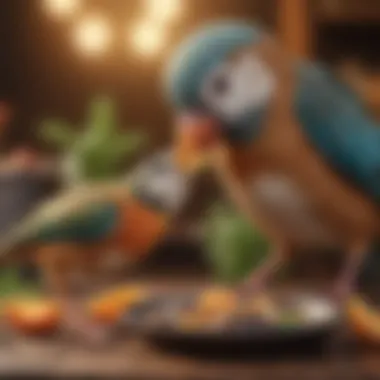
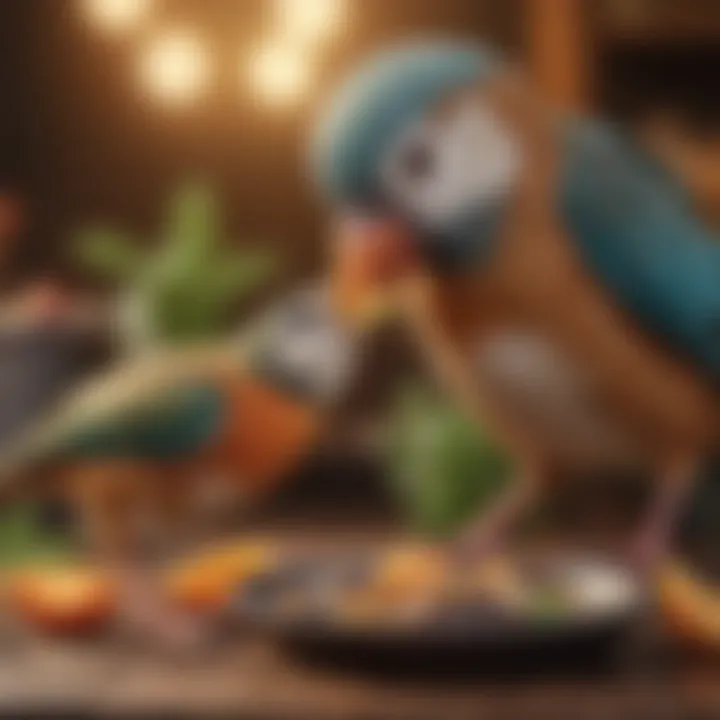
- Look for pellets with whole food ingredients.
- Make sure they provide proper nutrition for the bird species.
In summary, integrating quality pellets with noted seeds establishes a better foundation for your pet bird's diet.
Fresh Fruits and Vegetables
Fresh produce is sometimes overlooked in bird feeding regimens. Nevertheless, fruits and vegetables introduce vital vitamins, minerals, and antioxidants into a bird’s diet. Incorporating a variety of these foods can aid in keeping your bird variably interested in their meals. Some birds enjoy particular items undoubtedly more than others, necessitating experimentation.
It’s crucial to note that certain fruits and vegetables like avocado can be toxic to birds. Knowledge about suitable produce should influence choices.** Here’s a list of bird-friendly options:**
- Carrots
- Broccoli
- Apples (without seeds)
- Spinach
- Sweet potatoes
The best approach involves gradually introducing new items, observing the bird's reactions, to construct a rich and varied diet.
Grains and Nuts
Grains and nuts also promote well-rounded nutrition. They provide protein and essential fatty acids that are crucial for overall health. Many gratified species haven’t a problem gratifying chosen nuts like almonds or walnuts. However, portion control is important since nuts are calorie-dense.
Similarly, consider offering whole grains like quinoa, brown rice, or whole grain bread occasionally. These additions diversify the diet and introduce new textures and flavors for enjoyment.
Essential Nutrients for Pet Birds
Proper nutrition is fundamental for pet birds. It not only affects their physical health but also impacts their behavior, mood, and longevity. Focusing on essential nutrients will help to establish a diet that supports both their wellbeing and happiness. This section details crucial nutritional components needed for all pet birds, ensuring they thrive in a domestic environment.
Vitamins and Minerals
Vitamins and minerals play a vital role in sustaining the overall health of birds. Without sufficient intake, birds can suffer from various health issues, even leading to more severe conditions. Common vitamins required include Vitamin A, D, E, K, and the B vitamins. These vitamins support vision, skin and feather health, and metabolic processes.
Minerals, particularly calcium and phosphorus, are equally essential. They are necessary for strong bones and healthy egg production in females. A lack of calcium, for instance, may lead to eggshell issues in laying females, or metabolic bone disease. Therefore, it is crucial to incorporate a range of natural foods into their daily diet. Fresh fruits, vegetables, and a balanced seed or pellet diet enriched with these vitamins and minerals are typically good choices. Regular trials with various foods will also help identify preferences and nutritional needs.
Key dietary sources for vitamins and minerals:
- Fruit such as berries or citrus
- Vegetables like leafy greens, carrots, and peas
- Commercial pellets formulated for specific species rights
- Calcium sources, including cuttlebone or mineral blocks
Feeding Techniques and Strategies
Feeding techniques and strategies vastly influence the well-being of pet birds. To ensure these unique companions are thriving, it is necessary to adopt various feeding approaches that foster regular and healthy eating behaviors. An established feeding routine, encouragement of beneficial eating habits, and inclusion of occasional treats all play pivotal roles in achieving balanced nutrition for your feathered friends.
Setting a Feeding Routine
Establishing a consistent feeding routine is essential for your birds. Birds are creatures of habit, and routine can foster a sense of security. Setting feed times encourages them to eat on a regular basis. This not only prevents overeating at times but also minimizes the chance of food waste. It's advisable to serve meals at the same times each day, preferably when the household is quiet. This creates an ideal environment where your birds feel more relaxed while eating.
In addition to schedule, the monitor of the quantity served peut help to fine-tune their diets. It's significant to properly measure the portions, taking into salariés account their age and activity levels. Over time, experienced bird owners learn to gauge how much their birds require. Autodidact observation becomes key as healthy weight is an indicator of a well-planned feeding regime. Incorporating a log or journal can also be helpful in tracking dietary habits.
Encouraging Healthy Eating Habits
Ingraining healthy eating habits in your birds starts with the right mentality. One way to do this is to encourage exploration of new food variants and textures you provide. Complement the regular diet with new offerings gradually. Offering fresh fruits and veggies can spark their curiosity. A diverse menu can promote balanced nutrition and keep them engaged.
It's important to prevent boredom by rotating the types of birds food. This also piques interest and creates stimulating interaction during meal times. Limit access to the traditional seed-based diets. Including pellets that contain an balance of essential nutrients results in a healthier bird in the long run.
A challenging aspect could be some birds show preferences that steer them away from certain offerings. Resist the urge to over-reward them with favored treats. This can entrench unhealthy preferences, leading to nutrient gaps. Instead, patiently continue introducing nutritious options.
A balanced approach with gradual inclusion of healthy foods often yields the best results.
Addressing Dietary Issues
Addressing dietary issues in pet birds is paramount for their overall health and can significantly impact their behavior and longevity. An appropriate diet ensures that birds receive the necessary nutrients,3 thus promoting bodily functions and well-being. Understanding how to recognize dietary deficiencies and making suitable adjustments can directly affect the avian quality of life. Moreover, anticipating and preventing problems through proper nutrition serves as a critical responsibility for pet owners.
Recognizing Signs of Malnutrition
Identifying signs of malnutrition is necessary to act promptly. Pet bird sulph could exhibit various indicators, such as:
- Poor feather condition: Feathers may become dull, frayed, or shorter.
- Weight changes: Sudden weight loss or gain can indicate dietary problems.
- Behavioral changes: Increased aggression or lethargy may mean nutritional deficiencies.
- Changes in droppings: Abnormal fecal consistency might suggest dietary problems.
Observing these signs regularly fosters a proactive approach. The cues mentioned signal that re-evaluation of feeding practices is essential.
Consulting a Veterinarian
A veterinarian specialized in avians can offer expert guidance toward appropriate nutrition. Regular check-ups help ensure that any potential dietary issues are addressed early. A vet may conduct tests or provide consultations about:
- Necessary dietary adjustments based on size, age, and health status.
- Recommendations for specific feed types-chose quality brands to ensure nutrrition.
- Strategies for incorporating a more balanced diet for one’s feathered friend.
Consulting with a veterinarian serves not merely for treatment but also as a prevention measure, greatly supporting the wellbeing of pet birds.
Adjusting Diet for Aging Birds
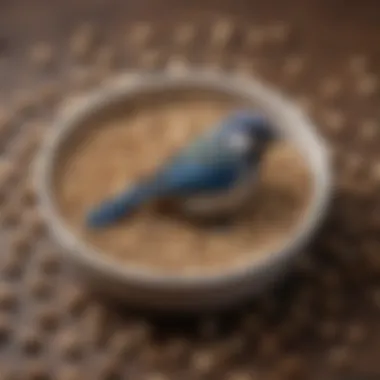
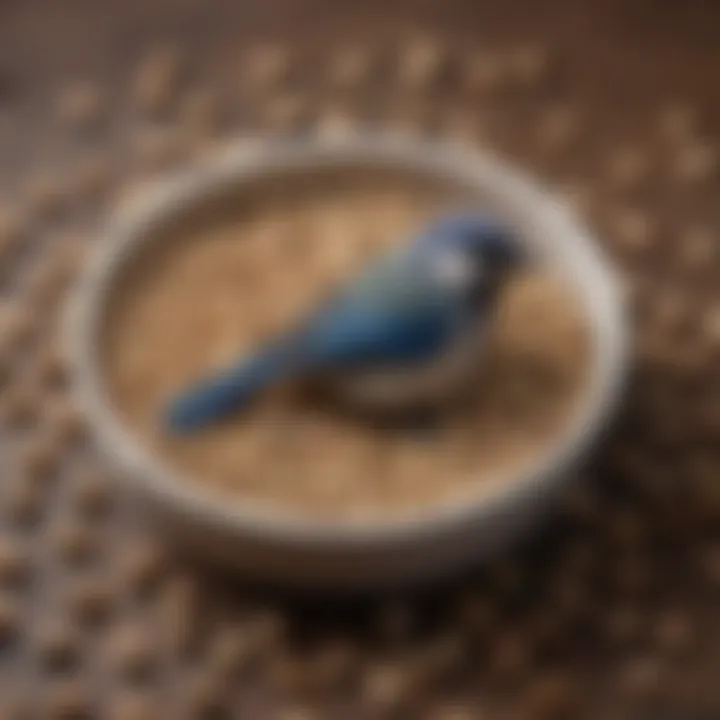
Aging birds develop changed nutritional needs requiring adjustments in their diet. Here are key considerations:
- Increased protein: Older birds may need more protein to support metabolic functions.
- Easier-to-digest foods: Options like cooked quinoa or steamed vegetables enable easier consumption.
- Limited seeds: Seed-heavy diets can exacerbate obesity or heart conditions in older birds.
Adjusting dust will, importantly, promote a healthy management of weightatrol and support a parrot's vital functions. By adapting diets appropriately, owners can prevent or reduce age-related health problems and significantly impact their bird’s comfort and vitality in the final stages of their lives.
Regular attention to dietary practices allows for informed decision-making and a deeper bond with your feathered companions.
Exploring Specialty Diets
Feeding pet birds can be a nuanced experience. Many owners look for ways to enhance the health and well-being of their avian friends. The exploration of specialty diets in bird care plays a crucial role in better understanding how unique dietary needs can affect overall bird health and lifespan. Providing a range of food options not only satisfies taste preferences but also accommodates the varied nutritional elements needed across different species. This section will delve into two specific areas of specialty diets – organic and natural options and commercial diets. Both approaches come with their distinct benefits and considerations.
Organic and Natural Food Choices
Organic and natural food options have gained traction as more pet owners shift towards holistic care. These diets can offer numerous benefits for birds. Naturally sourced foods tend to have fewer chemicals and preservatives, which may lead to less exposure to harmful substances, promoting better health undeterred by artificial additives. Fresh fruits, vegetables, grains, and legumes can frequently comprise an organic avian diet. When given such nutrients naturally, birds can fulfill their thirst for varied tastes while maximizing their nutrient absorption.
Pros of Organic Choices:
- Fewer Chemicals: Organic foods typically contain no artificial additives, pesticides, or hormones.
- Freshness: Many organic items come from local farmers or home gardens, ensuring greater freshness.
- Varied Diet: Providing a combination of fruits, vegetables, nuts, and seeds can lead to a balanced diet filled with vibrant colors.
- Ethical Sourcing: Often, organic diet practices focus on sustainability and animal care.
However, not every pet bird owner may have access to a complete range of organic products. Additionally, they may find these items more expensive than conventional options. It’s vital for owners to carefully choose their sources to ensure that the food provided is of high quality without leading to unnecessary waste or overhead costs. It is always advisable to inspect labels and nutrition facts before purchases. Giving your feathered companion organic and natural foods can sometimes be challenging, but the commitment can pay off significantly in their vitality, provided proper knowledge is in place.
Commercial Diets: Pros and Cons
Commercial diets for pet birds often come pre-packaged as pellets or seed mixes. These offerings are designed meticulously to meet a variety of nutritional requirements, offering convenience for bird owners.
Pros:
- Balanced Nutrition: Many commercial diets are fortified with essential vitamins and minerals necessary for birds’ health.
- Convenience: Ready-to-use options account for less preparation time, which can ease feeding routines.
- Consistency: Known formulas can help maintain dietary consistency, something essential for birds
- Easy Availability: Commercial options are typically more accessible in pet stores and online than natural foods.
Despite the various advantages, owners also need to examine the quality and ingredients of commercial diets closely. Some products use fillers instead of nutritious items, which could negatively impact bird health in the long term.
Cons:
- Ingredient Quality: Low-quality fillers and unnecessary additives could undermine the expected health benefits.
- Limited Variety: Birds may tire of a monotonous diet even despite balanced nutrition.
- Over-Reliance: Relying solely on artificial diets may deprive birds of the experience of eating whole, fresh foods. -Some commercial diets may not align with an individual's tastes, thus limiting variety in their feeding routine, which is vital for the stimulation and health of the birds.
As you consider the route of selecting either organic or commercial diets, it’s essential to understand each option's qualities thoroughly. Optimization lies in blending various choices suited to specific species and comprehensively respecting their individual needs.
Creating an Ideal Feeding Environment
Creating an ideal feeding environment for pet birds is crucial for their health and well-being. How birds eat and their relationship with their surroundings can significantly influence their behavior and nutritional intake. An appropriate feeding setup can encourage positive eating habits, help prevent waste, and promote overall happiness in birds.
Several specific elements contribute to the ideal feeding environment. Firstly, the location of the feeding area should be quiet yet accessible to the birds. Birds are naturally cautious creatures; hence placing their food stations in less busy areas can reduce stress. Additionally, taking into account the natural light in the room can further enhance the experience for the birds. Sunlight might encourage foraging behavior while ensuring food remains fresh.
The design of the feeding stations also plays a role. Removable and easy-to-clean bowls can help maintain hygiene, directly affecting the birds' health. Also offering a variety of textures and types in food containers can stimulate the birds' sense of exploration and curiosity, promoting engagement with their meals. Considering these factors creates an inviting atmosphere that caters to a birds' natural instincts while supporting their dietary needs.
Feeding Stations: Design and Placement
The design of the feeding stations should facilitate safe and easy access for birds. Shallow bowls are ideal, as they can reduce the risk of accidental topple and help birds feed without the risk of entrapment. Consider using ceramic or stainless-steel bowls, as these materials resist bacterial growth and are easier to clean.
Placement of feeding stations is another important factor. Birds can be timid, hence positioning bowls at the bird's eye level helps they feel secure. You should avoid placing their feeders too near toys or perches, which might cause competition among birds during feeding. Mixing food types in opposite bowls can also promote variety and pique their interest.
It's noticeable that changing the feeding locations periodically may encourage exploration, helping birds develop confidence and enrich their environmental experience. These strategies show that the feeding station can be both functional and flexible, fostering a beneficial environment dedicated to nutrition.
Preventing Food Waste
Preventing food waste is a valuable aspect of creating a sustainable feeding environment. It not only can save money but also ensures that the food provided to pet birds is fresh and nutritious. Managing portions correctly becomes relevant here, as offering too much food can lead to leftovers that may spoil or become stale, potentially affecting the health of the birds.
Utilizing clear containers can help monitor food levels more easily. This can prevent unnecessary waste and ensure that birds consume meals promptly. Additionally, introducing the
End
Challenges can arise as bird owners navigate through choices. It is important to choose the best diet relevant to the species in your care. Furthermore, being educated on signs of malnutrition can significantly aid in combating potential deficiencies before they develop into more serious health issues.
Proper nutrition provides the foundation for a happy and healthy avian companion. Thus, ensuring regularly rotating food and always offering new options can improve palatability and nutrition.
Additionally, providing support in creating a suitable feeding environment enhances their ability to thrive. Ultimately, a focused approach where nutrition is prioritized facilitates a deeper bond between pet owners and their birds while nurturing their overall contentment. Let’s ensure we put our best foot forward in fulfilling our bird's dietary requirements, as our commitment reflects directly on their health and quality of life.
Summarizing Key Takeaways
As covered in this article, several key takeaways have emerged for pet bird owners:
- Balanced Diet: Offering a mixture of seeds, pellets, fresh fruits, and vegetables ensures comprehensive nutrition.
- Recognizing Needs: Different bird species have unique dietary requirements. Researching these requirements can prevent common feeding mistakes.
- Consult Experts: Regular checks with a veterinarian are vital. They can offer tailored advice specific to your bird’s health conditions and age influences.
- Observe Habits: Monitoring your bird’s eating habits can help identify any potential nutritional deficiencies early.
- Creating Environment: A well-organized feeding station and proper food storage can greatly influence the eating behavior and prompt healthier choices.
Continued Learning for Bird Owners
The journey of understanding bird nutrition does not end with this guide. Continuous education is essential for those who seek to provide the best care for their avian companions. Here are few approaches to enhance your knowledge:
- Engage with Communities: Online platforms such as Reddit or Facebook have groups dedicated to pet birds focusing on sharing experiences and advice.
- Resources and Articles: Websites like Britannica and Wikipedia contain valuable references. Explore articles on specific diets and avian health to gain further insights.
- Attend Workshops: Community-hosted workshops covering avian nutrition can afford practical experience alongside theoretical knowledge.
- Follow Veterinary Guidelines: Stay up to date with the newest findings on bird care and dietary enhancements discussed in veterinary literature.
In summary, cultivating an ever-evolving understanding of avian diets will undoubtedly lead to healthier, happier pet birds. With your ongoing commitment and willingness to learn, the quality of life for your feathered friends can be profoundly elevated.















